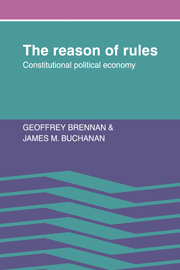Book contents
- Frontmatter
- Contents
- Preface
- 1 The constitutional imperative
- 2 The contractarian vision
- 3 The myth of benevolence
- 4 Modeling the individual for constitutional analysis
- 5 Time temptation, and the constrained future
- 6 Politics without rules, I: Time and nonconstrained collective action
- 7 Rules and justice
- 8 Politics without rules, II: Distributive justice and distributive politics
- 9 Is constitutional revolution possible in democracy?
- Index
4 - Modeling the individual for constitutional analysis
Published online by Cambridge University Press: 05 November 2011
- Frontmatter
- Contents
- Preface
- 1 The constitutional imperative
- 2 The contractarian vision
- 3 The myth of benevolence
- 4 Modeling the individual for constitutional analysis
- 5 Time temptation, and the constrained future
- 6 Politics without rules, I: Time and nonconstrained collective action
- 7 Rules and justice
- 8 Politics without rules, II: Distributive justice and distributive politics
- 9 Is constitutional revolution possible in democracy?
- Index
Summary
Introduction
Any analysis of the effects of alternative rules on patterns of outcomes emergent from social interaction must embody some assumptions about the nature of the persons who interact. In this chapter, our objective is to set out our own assumptions and to defend them. This is no small order. The basic model of the individual that we shall advance as the most appropriate for comparative institutional or constitutional analysis – for investigating the implications of alternative sets of rules – is basically the Homo economicus construction of classical and neoclassical political economy. Earlier experience demonstrated to us that the use of this model, particularly outside conventional market settings, is widely regarded (even within the economics profession) as one of the most objectionable features of what has been called the new “economic imperialism.” We do not propose to, and indeed cannot, restrict our discussion to behavior in alternative market orders. Much of our attention will be directed toward behavior in nonmarket institutions, and to behavior in political processes in particular. Hence, we shall have to confront the general antipathy to the use of the Homo economicus model in nonmarket settings and to deal with possible objections.
There is no question that such antipathy exists. In some of our recent work, for example, in which we attempted to develop a theory of the fiscal and monetary powers to be assigned to political agents, we modeled those agents precisely as their counterparts in market contexts are modeled by economists.
- Type
- Chapter
- Information
- The Reason of RulesConstitutional Political Economy, pp. 46 - 66Publisher: Cambridge University PressPrint publication year: 1986



